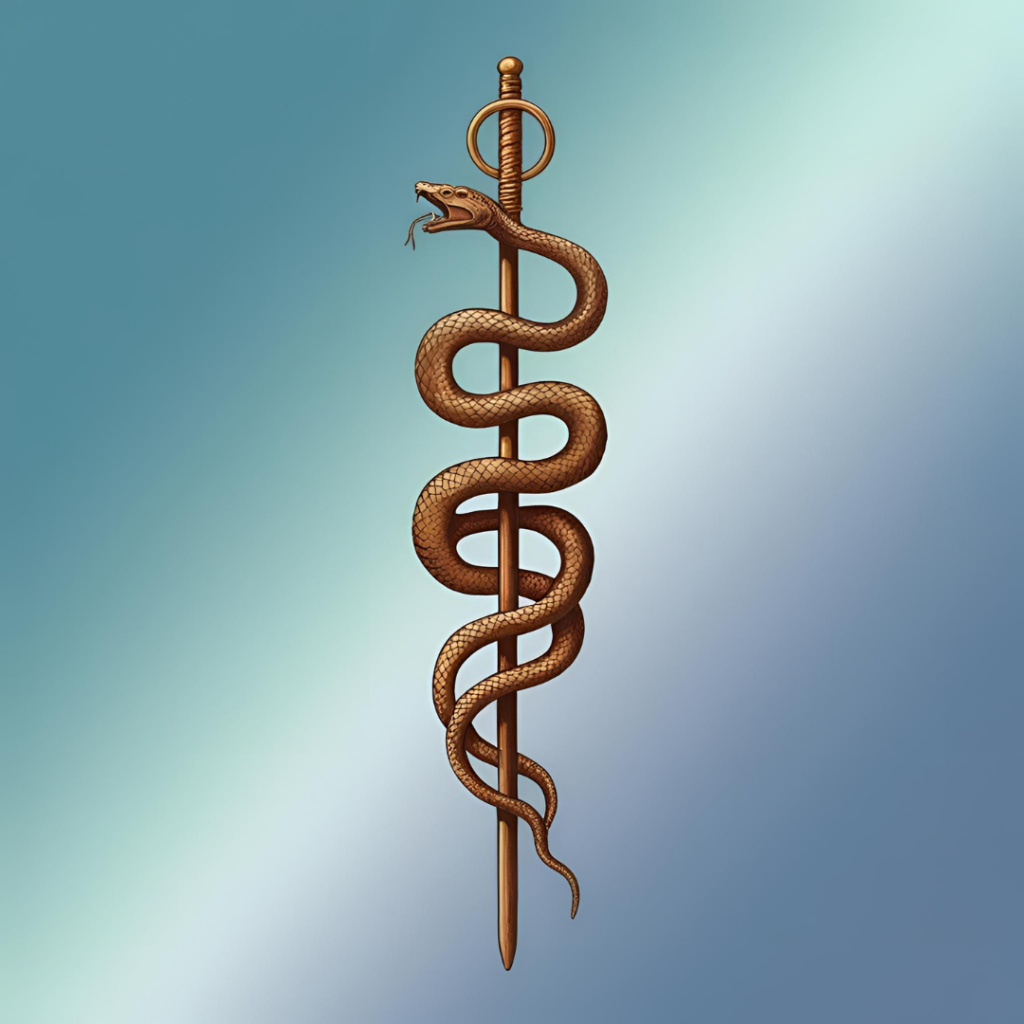Many of you have probably seen something called the “staff of Asclepius.” It is actually the original symbol of doctors (and other healing professionals) and was named after the Greek god, Asclepius. Asclepius was the son of Apollo, a physician, and became an amazing healer who surpassed his father (and many others) in his ability to heal people – even to the point of preventing death and bringing back people who had died.

In Greek mythology, snakes were considered sacred, in part because of their ability to shed their skin (which was thought of as regeneration) and their venom was often used for medicinal purposes.
There is also some evidence that this symbol is rooted in or influenced by the story we hear today from Numbers 21. Moses is leading the people through the desert and they find themselves getting bitten by a lot of snakes. The people are up in arms, and so Moses prays to God for help. God says, “‘Make a saraph and mount it on a pole, and whoever looks at it after being bitten will live.’ Moses accordingly made a bronze serpent and mounted it on a pole, and whenever anyone who had been bitten by a serpent looked at the bronze serpent, they lived.”
What is incredible about this story, is that the “cure” for the harm comes from gazing upon the thing that was harmful in the first place.
While this may seem amazing, we have many modern examples of this. For example, vaccines inject inert viruses into people so that the human immune system can develop resistances. Or in homeopathy, small doses of things (that could harm or kill us at higher levels) are given in increasing levels to help us build our tolerance over time.
I think a similar phenomenon is happening spiritually here, and the idea that a thing that might be harmful to us can be useful under the right circumstances.
Someone who has influenced me a lot in Resmaa Menakem. He wrote a profound book called, “My Grandmother’s Hands” which discusses how we work to heal racism in our bodies.
In another blog post, I referenced Resmaa’s ideas around Resmaa speaks of “clean pain” and “dirty pain.” He says that “clean pain is the pain that mends and can build our capacity for growth. It is the pain we experience when we don’t know what to do, when we are scared, and when we step forward into the unknown anyway, with honesty and vulnerability…Dirty Pain on the other hand, is the pain of avoidance, blame, and denial. When people respond from their most wounded parts, become cruel or violent or run away, we experience dirty pain.”
In so many ways, I hear today’s reading from Numbers encouraging us to do “clean pain” work – of actually facing that things that have harmed us and working to honestly address them (instead of passing that energy along to others). Ironically, when we avoid addressing pain and discomfort, we create more of it for ourselves and for others.
We recently had Lydia Wylie-Kellermann visit our Spiritus community. She was our guest homilist over the weekend and spoke about some themes from her beautiful and tender book This Sweet Earth: Walking With Our Children In The Age Of Climate Collapse (I can’t recommend this book enough!). In one chapter, she is talking about a dialogue that she had with the amazing author, activist and visionary Joanna Macy – who has been at the forefront of trying to address climate change for decades.
To do the work of addressing climate collapse, Macy says that it will require facing that “there is a lot we will have to relinquish…So take a deep breath and don’t close down.” Lydia reflects on this and says, “It’s so easy to close down…The bricks on my chest want to force me under the covers. Or on other days, I want to look away and pretend I can go on living as if this isn’t happening.”
Our culture is one that offers us a million ways to numb and distract ourselves, and ours is a culture that encourages various forms of disconnection. Dr. Claudia Black who has done a lot of work related to the effects of addiction in families identifies numerous “rules” that many families impacted by addiction take up. These include: don’t think, don’t feel, don’t ask questions, and don’t talk.
No healing can happen when these rules are followed.
So whether we’re trying to face collective challenges or personal ones that we are up against, gazing upon the challenge – looking at it deeply and lovingly – offers us a chance to heal from it. Talking. Feeling. Thinking. Questioning. These all start to happen when we gaze upon what bit us. No doubt they can feel overwhelming and daunting, but they represent a path to freedom and liberation from the pain.
Looking away, pretending that it is not there, numbing and carrying on with business as usual almost guarantees that we will pass “dirty pain” onto someone else. And as the great James Baldwin reminded us so long ago, “not everything that is faced can be changed. But nothing can be changed until it is faced.”
In our gospel today from John 8, Jesus tells the crowd that “the one who sent me is with me. God has not left me alone.” God does not leave us alone in this work of healing and restoration. We have a community of people committed to truth-telling, healing and wholeness. And we have Jesus who will walk with us on every step of our journey.
One Comment
George Dardess
Great connections here. Mike.
St John of the Cross is helpful here— where one’s cross, whatever it may be, becomes the source of the “good pain,” the one that truly heals. It seems like such a counterintuitive idea until one tries it, trusting in God’s mercy to do what we can’t.
Commenting has been turned off.